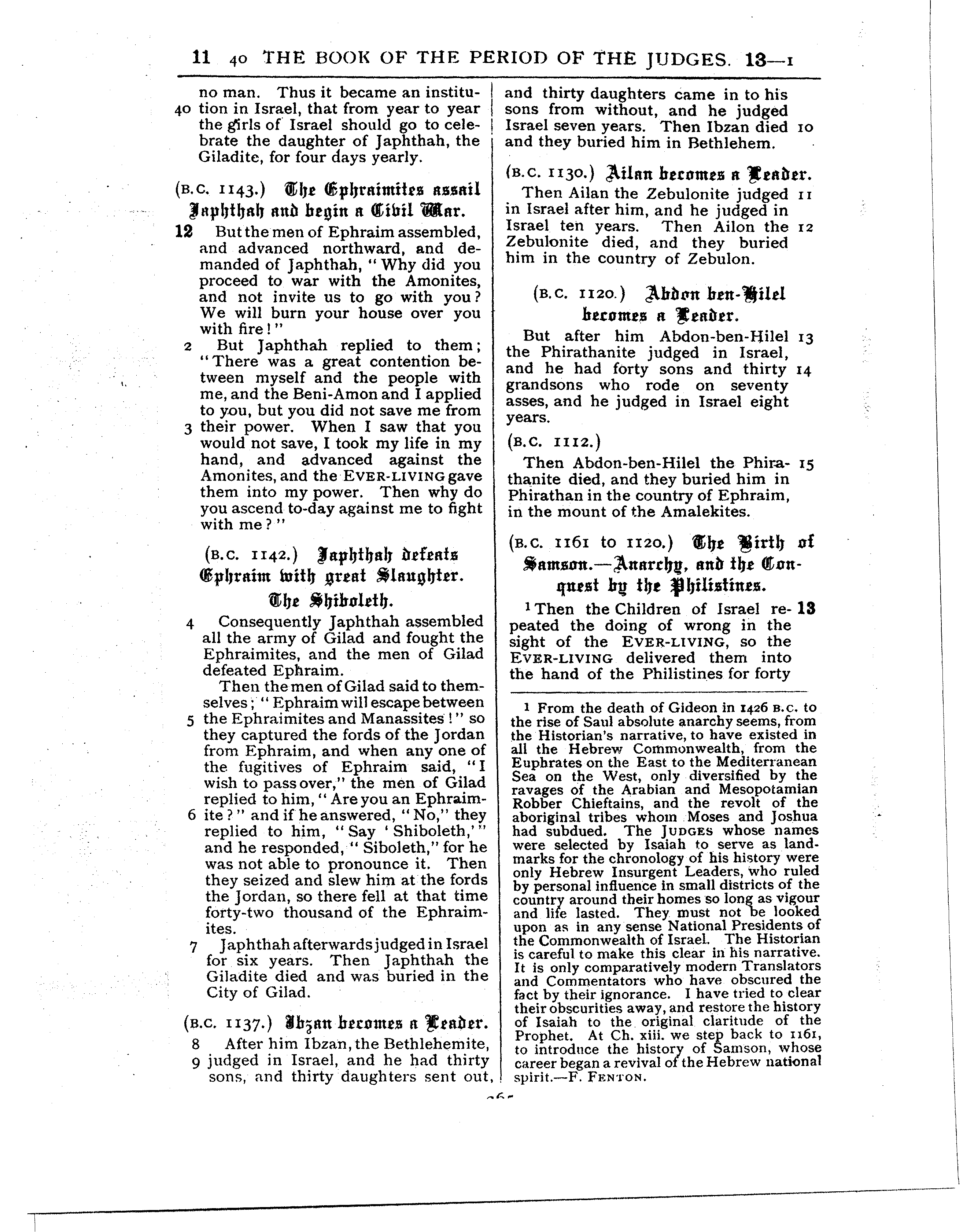Judges - Ferrar Fenton Bible Translation page 265
The History of the People of Israel
40 tion in Israel, that from year to year the girls of Israel should go to cele- brate the daughter of japhthah, the Giladite, for four days yearly. (B.c. 1143.) GDI32 (Ephrnimiiw assail gnplyilyab mth begin n Eihii War. 12 But the men of Ephraim assembled, and advanced northward, and de- Why did you proceed to war with the Amonites, and not invite us to go with you? We will burn your house over you But japhthah replied to them;
1`here was a great contention be- tween myself and the people with me, and the Beni·Amon and I applied to you, but you did not save me from their power. When I saw that you would not save, I took my life in my hand, and advanced against the Amonites, and the·EvER-L1v1NG gave them into my power. Then why do you ascend to·day against me to fight (ac. 1142.) gapbtbab hzfzniz ®plyraim with great §laugl)ie1·. Wye §hilm1eil). Consequently japhthah assembled
all the army of Gilad and fought the Ephraimites, and the men of Gilad defeated Ephraim. Then the men ofGi1ed said to theme
Ephraim will escape between so they captured the fords of the jordan from Ephraim, and when any one of I the men of Gilad Are you an Ephraim- they Say ‘Shiboleth,’ for he was not able to pronounce it, Then they seized and slew him atthe fords the jordan, so there fell at that time forty—two thousand of the Ephraim- ites. 7 japhthah afterwards judged in Israel for six years. Then japhthah the Giladite died and was buried in the City of Gilad. (ac. 1x37.) Eligan hecsmer ex ¥eaber. 8 After him lbzan,the Bethlehemite, g judged in Israel, and he had thirty sons, and thirty daughters sent out, and thirty daughters came in to his sons from without, and he judged Israel seven years. Then lbzan died xo and they buried him in Bethlehem. (ac. 1130.) Qilan hemmes at Zeaher. Then Allan the Zebulonite judged
in Israel after him, and he judged in Israel ten years. Then Ailon the Zebulonite died, and they buried him in the country of Zebulon. (ac. 1120.) $11hnn l1en·§i1el BEIUIXIBS 8 EERUBY. But after him Abdon·ben-Hilel
the Phirathanite judged in Israel, and he had forty sons and thirty grandsons who rode on seventy asses, and he judged in Israel eight years. (ac. 1112.) Then Abdon-ben-Hilel the Phira·
thanite died, and they buried himin _ Phirathan in the country of Ephraim, in the mount of the Amalekites. (ac. 1161 to rrzo.) ®l)e §irtly II I2 uf Samsmt.-—§mn·c}yg, mth the Ginn- quest hg the ¥l;1lx¤hne¤. lThen the Children of Israel re- 13 peated the doing of wrong in the sight of the EvER—-LIVING, so the EvER·LIV1NG delivered them into the hand of the Philistines for forty 1 From the death of Gideon in 1426 n.c. to
the rise of Saul absolute anarchy seems, from the Historians narrative, to have existed in all the Hebrew Commonwealth, from the Euphrates on the East to the Mediterranean Sea on the West, only diversined by the ravages of the Arabian and Mesopotamian Robber Chieftains, and the revolt of the aboriginal tribes whom .Moses and joshua had subdued. The junoes whose names were selected by Isaiah toserve as land- marks for the chronology of his history were only Hebrew Insurgent Leaders, who ruled by personal influence in small districts of the country around their homes so lonas vigour f%and li e lasted. They. must not e looked upon as in any sense National Presidents of the Commonwealth of Israel. The Historian is careful to make this clear in his narrative. It is only comparatively modern Translators and Commentators who have obscured the fact by their ignorance. I have tried to clear their obscurities away, and restore: thc history of Isaiah to the original clarimde of the Prophet. At Ch. xiii. we ste back to 116x, g duce the historof amson, wh to introiy ose career began a revival 0 the Hebrew national spirit.··-F. FEN·1·oN. Aéa
